April 9, 2017
by Carole Zangari -
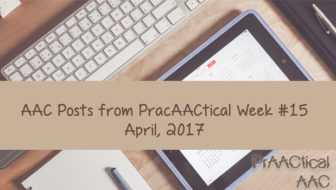
Happy Sunday, AAC friends. Here are some posts you may have missed. Monday: 5 Misconceptions About Core Vocabulary in AAC Wednesday: Video of the Week: From Presence to Contribution – A Family’s Journey Towards an Inclusive Life Thursday: PrAACtical Resources: Behavioral Supports for Young Children
Filed under: Featured Posts
Tagged With: ASD, summary post
April 6, 2017
by Carole Zangari -
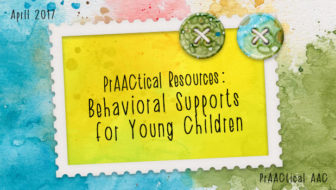
One of the biggest stressors for therapists and educators who work with AAC is dealing with challenging behavior. In today’s post, we share a wonderful set of resources on positive approaches to preventing, minimizing, and de-escalating instances of challenging behavior. The Technical Assistance Center of Social Emotional Intervention for Young Children produced a number of resources that are available on their website here. Topics include: Tips and forms for getting started Using a Buddy System Teacher tools Turtle Technique Visual supports Using scripts Circle time tips Dealing with feelings Strategies for families to use at home There is also a helpful Tool Kit that can be accessed via the image below.
Filed under: Featured Posts, PrAACtical Thinking
Tagged With: behavior, positive behavior supports, preschool
April 3, 2017
by Carole Zangari -
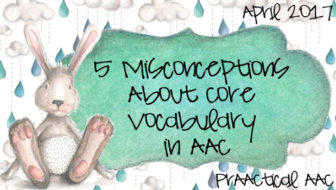
When we first started writing about core vocabulary, it was largely due to the fact that most SGDs, AAC apps, and communication boards/ books had two big deficits. At the time, most of them lacked the words needed to function throughout the day and/or didn’t have the kinds of words that allow for progression of syntactic skills. Now things look very different. Over the years, the pendulum has moved quite dramatically and now core vocabulary permeates AAC systems that are considered to be ‘robust.’ That’s a lot of movement in a short period of time. When big changes happen rapidly, it stands to reason that there will be some cracks that open up. Misunderstandings, misinterpretations, misconceptions. Here are some of the ones we’ve observed in the recent past. Core words are all that are needed in an AAC system. (Not in most cases. We all want to talk about the... [Read More...]
Filed under: Featured Posts, PrAACtical Thinking
Tagged With: core vocabulary, misconception, myth
April 2, 2017
by Carole Zangari -
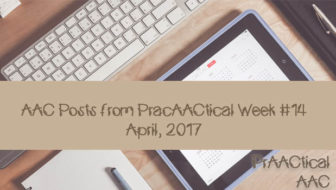
The start of April is always a busy time. We launched Autism Awareness and Acceptance Month by learning more about how to differentiate instruction in ways that let kids with autism and other communication challenges grow and shine. Thanks, Phyl Macomber and UM-NSU CARD for a great day of learning and connecting! Hope your start to the month was equally enriching. Monday: PrAACtically April: AAC Resources for A Year of Core Words Tuesday: PrAACtical Alert: AAC App News (Throughout the month, we’ll keep updating this with news of AAC app discounts and other sales on autism-related materials). Wednesday: PrAACtically April: AAC Resources for A Year of Core Words Thursday: 30 Ways to Support Autism Awareness & Acceptance Month
Filed under: Featured Posts
March 30, 2017
by Carole Zangari -
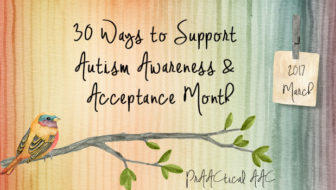
April is just around the corner and that means we’re getting ready to support the acceptance and inclusion of autistic people. Looking for ideas? Here are some to get you started. Treat yourself to some goodies from The Chocolate Spectrum (where you can order online, visit the cafe, or take a chocolate-making class) or other places that employ people with autism. Read and share 5 references that support the use of AAC & Autism. Help your family or community go beyond awareness and into acceptance. Learn and share information about Autism Safety – Be AWAARE! Know an autistic MineCraft lover? Introduce them to AutCraft. Educate yourself on terminology that relates to autism and people with ASD. We may have learned people-first language back in grad school, but there are different points of view on that. This is a great time to learn about identity-first language. Apply your critical reasoning skills to... [Read More...]
Filed under: Featured Posts, PrAACtical Thinking
Tagged With: acceptance, ASD
March 28, 2017
by Carole Zangari -
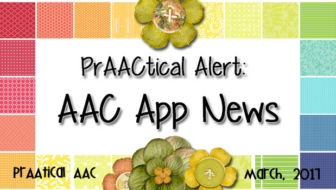
NOTE: Scroll down for the latest update on AAC app discounts and other sales. —————————————- Many of you know the work of Pennsylvania-based SLP Lauren Enders, whose contributions here and on Pinterest, Facebook, and other social media have been invaluable in our clinical and educational work. Lauren does a terrific job of identifying AAC, AT, and related resources and goes the extra mile in sharing them with others. Today, we feature a graphic that she developed to alert us of AAC apps that are discounted in support of Autism Awareness and Acceptance Month in the US app store. The discounts may be available in other areas as well. The graphic is not interactive so if you wish to purchase an app, you’ll need to visit the iTunes App Store and search for the app you’re interested in or visit the company’s website. OR you can scroll down to the bottom... [Read More...]
Filed under: Featured Posts, PrAACtical Thinking
Tagged With: acceptance, Apps, Autism Awareness Month
March 27, 2017
by Carole Zangari -
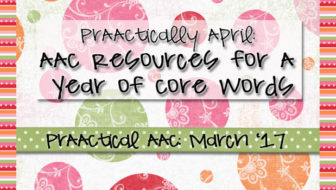
It’s almost time to turn the calendar to a new page and that gives us the opportunity to highlight a new set of core words. Whether you are following along with the Set 1 (2013) (12 words/month) or the Set 2 (2014) words (16 words/month; Different than the previous year’s core words), or are just getting started, this post has some helpful resources. We’re grateful to Nancy Inman, Brian Whitmer, Tina Lombardi, Barbara Fernandes Russell Cross, Gail Van Tatenhove, Allison Wade, Eric Sailers, Bill and Lori Binko, Heidi LoStracco, Rachael Langley, and all the others who have contributed to this effort. Our words for this month are as follows. Set 1 (2013) List: big, busy, do, drink, feel, he, in, make, out, some, tell, who Set 2 (2014) List: blue, brother, close, family, head, last, long, no, old, right, scared, soft, thing, top, wash, whole Here are some resources to help with implementation. Templates... [Read More...]
Filed under: Featured Posts, PrAACtical Thinking
March 26, 2017
by Carole Zangari -
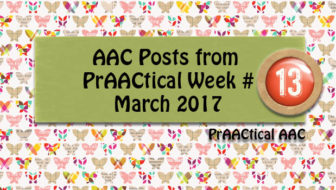
It’s hard to believe that March is almost over! Anyone else busy planning for Autism Awareness and Acceptance Month? In the meantime, here are a few posts from last week. Monday: Using Metaphors to Support Vocabulary Teaching Wednesday: Video of the Week: Make a Core Vocabulary Folder Thursday: How I Do It: Addressing the 4 Most Overlooked Operational Skills for High-Tech AAC Users
Filed under: Featured Posts
Tagged With: summary post
March 20, 2017
by Carole Zangari -
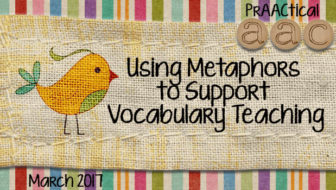
One of the really fun things about writing posts about vocabulary is that it gives us a great excuse to browse some teacher and SLP blogs. Sometimes their creativity blows me away, not to mention how incredibly engaging and cute they are! I especially love the creative themes that they use to go way beyond the ‘Vivid Verbs’ concept. Metaphors and visual imagery are both research-backed strategies for retaining new information. That’s important, especially as we move beyond core vocabulary and expose our AAC learners to a richer lexicon. Both can be used in a variety of games and activities and go a long way toward build engagement about new word learning. In the hands of an enthusiastic instructor, a metaphor can be developed into a theme that boosts the ‘fun factor,’ which is important when we’re trying to build the buzz around new word learning. Here are some of... [Read More...]
Filed under: Featured Posts, PrAACtical Thinking
Tagged With: imagery, Thematic Language Therapy, vocabulary
March 19, 2017
by Carole Zangari -
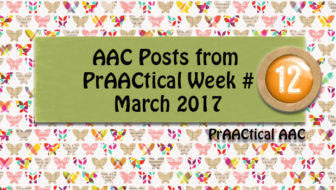
Here are a few AAC posts that you may have missed. Monday: PrAACtical Resources: Living with AAC Wednesday: Video of the Week: Developing a Personal AAC System Thursday: How We Do It: AAC Videos for Core Word Learning
Filed under: Featured Posts, PrAACtical Thinking









